Barbara Rainey's Blog, page 4
August 5, 2024
When You Want to Quit Your Marriage


Most of us marry with stars in our eyes and expectations that scrape the Milky Way. But there’s not a spouse on earth who hasn’t experienced harsh unexpected disappointments.
Have you entertained the thought of quitting your marriage at some level? Like piles of heavy wet snow on power lines and branches, accumulated hurts and disillusionment threaten to snap personal resolve as easily as limbs surrender to the overwhelming weight of winter’s crystals.
For Dennis and me, our overarching marriage narrative is a wonderful one because it is a tale of redemption. But in those hard places, before the redemption moments came, before it was spring again, we both experienced the pain of disappointment and loss. I wondered if we’d ever see beauty once more, or if we’d have to settle for a long winter.
I wanted to quit my marriage—not end it entirely, but I wanted to stop trying so hard in the cold heavy parts of our relationship. I felt, “This is too hard, we aren’t getting anywhere.”
I’ve been tempted, and these are real temptations from the enemy of our souls, to …
quit sex;quit working so hard to understand and be understood;quit serving and giving myself;quit biting my tongue and watching my words;quit trying and settle into détente.Quitting any area of marriage is slamming a door shut on intimacy. Like a thermometer, intimacy is the rising or falling temperature of your marital oneness and depth. Intimacy is not just sex. It’s communication, sacrificial love, self-control, courage … and sex.
What do you do when you feel hope is lost and you want to quit?
Ponder this question in reply: Why do you think Jesus spent so much time with tax-gatherers and sinners as the Pharisees so sharply accused? Quite simply because He knew that they knew their inadequacies and failures. Jesus saw hope for new life, new light in those men and women and children who understood they were broken, needy sinners.
Jesus taught, “Blessed are the poor in spirit, for theirs is the kingdom of heaven” (Matthew 5:3). Simply stated, we can’t receive the gifts of the kingdom unless we know we cannot attain them or buy them or earn them on our own.
We struggle and want to quit in our marriages because we underestimate the sinful natures of our spouse and ourselves. Marriage is hard because, in the words of Ruth Bell Graham, it’s the union of two sinners. As Romans 3:23 tells us, “all have sinned and fall short of the glory of God.”

I still remember some crisis points in our marriage. I felt frightened a few times, fearing we’d never find common ground again. I felt lonely, knowing we weren’t operating out of oneness and because I didn’t have anyone I could talk to. I felt unappreciated that my efforts to love, serve, and help weren’t met with the gratitude I had expected.
At my core, I was upset because I wasn’t getting what I wanted. Life wasn’t working the way I thought it should.
And I wanted to quit because I realized I wasn’t able to make it all work. Paul said basically the same thing when he wrote, “For I know that nothing good dwells in me, that is, in my flesh. For I have the desire to do what is right, but not the ability to carry it out” (Romans 7:18).
Though I felt emotions that scared me, God wasn’t bothered when I wanted to surrender and quit trying. In fact, He kinda liked me in that barren winter place … discovering that my expectations weren’t working … finding I wasn’t sufficient in myself to make everything work in my marriage. He knew I was disappointed with Him, too, and that didn’t bother Him a bit.
Why? Because true marriage is the union of three, not two.
In those alone moments when I had nothing else to try, no book with ten tips waiting on my nightstand, I prayed one of many desperate prayers over the years. I told God, “I have no idea what to do next, no idea what to say or try. Will You show me? Will you guide me?”
Never was there an immediate reply. I always wished for one, but learned to rest in His mysterious ways, to trust He could somehow break the ice … make a way … open my eyes to His beauty.
And that is what He wanted. “Come to Me,” Jesus said.
I was inadequate … my own attempts a failure … and I needed Jesus and only Jesus.

So what do you do when you feel hope is lost and you want to quit?
Come to Jesus.
His strength will help you resist the darkness that threatens; the darkness of unbelief and resignation … the darkness of lost hope. IF you will ask and IF you really want to follow Him.
His light will shine on your heart to illumine false thinking, small and large steps of new understanding. IF you are willing to see your sin; IF you are willing to change. (Is there that much sin in me? Oh yes, there is.)
When you come to Jesus, the third Person in your marriage, remember:
He is always praying for you to choose His way. Hebrews 7:25 says Christ “always lives to make intercession” for us.He is your husband when yours fails. Isaiah 54:5 tells us, “For your Maker is your husband.”He is your dearest Friend when you have no one. Jesus says, “You are my friends if you do what I command you” (John 15:14).He is your Comforter when you feel all alone; “Even though I walk through the valley of the shadow of death, I will fear no evil, for you are with me” (Psalm 23:4).He waits to guide you by His Spirit; “When the Spirit of truth comes, he will guide you into all truth” (John 16:13).Your challenge and mine is to believe all this is true and walk by faith when our feelings tell us the opposite. It’s what Jesus did all His life, but especially on the cross. And because He did, He can help us follow His steps.
God’s greatest joy is to rescue, resurrect and restore. It’s His specialty. He loves to take broken hearts, fractured relationships, and shattered hope, and restore it to better than it was before.
I pray you will make your marriage health your highest goal, seeking to grow your relationship with your husband and your Savior.
May you too be counted among those who didn’t quit and because you didn’t discover the wonder of the Resurrection!
The post When You Want to Quit Your Marriage appeared first on Ever Thine Home.
June 24, 2024
Building a Sense of Mission in Your Children
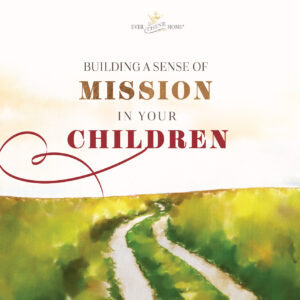
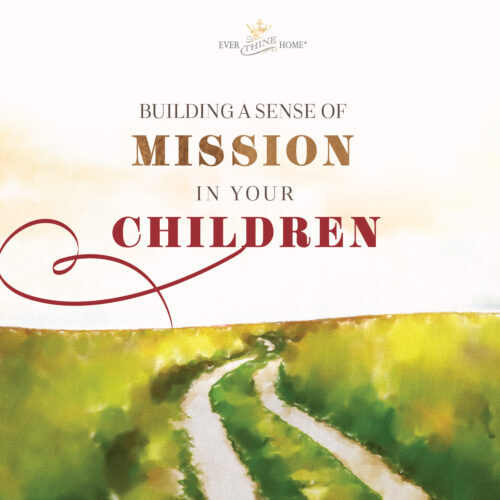
One of our highest goals for our children was for them to experience Christianity in at least one other culture, preferably a third-world country. Because it was a priority, we made it happen.
Three of our girls–then ages 12, 13, and 15–traveled with me to Russia in January of 1999. For three weeks we visited orphanages and held children, carried boxes of food and 20-pound bags of flour and rice to shelters, and shared the story of Jesus in schools, orphanages, and churches.
A translator, Anastasia, accompanied us each day, and one night she invited six of us to her apartment for dinner. Anastasia met us at our hotel in the afternoon twilight. From there we walked, then rode the subway, and finally followed her down a maze of streets until we stopped at a neighborhood outdoor market where she purchased a can of meat and a few potatoes. Then we continued walking to her apartment building.
Once inside, we climbed the stairs to her tiny little residence, shed our multiple outer layers, and began helping her prepare dinner. Several of us peeled potatoes while Anastasia handed out simple plates and cups. She moved her small table away from the wall to make room for our group of six and pushed the other sparse furniture back against the walls. Then she opened the can of meat and poured it into the pot of potatoes to complete our meal.
As we sat crowded around her small table, I was grateful for this sweet young woman who so patiently guided us each day on our journeys and translated for us. I was thankful for our fellowship as believers which tasted a bit like I imagined heaven. But mostly I was thankful that my girls were experiencing what it looked like to be a Christian in another country. It was much more difficult than in America.
In later years Haiti, China, and Estonia also welcomed our children, one for two months in very primitive conditions and another in communist-block housing for a year. American Christianity is often not the purest form of our faith … it’s clouded and often compromised by our nation’s prosperity and love of comfort. Opening our children’s eyes to other cultures and to a global vision of God’s love for all gave them a greater understanding of God and His work throughout the world.
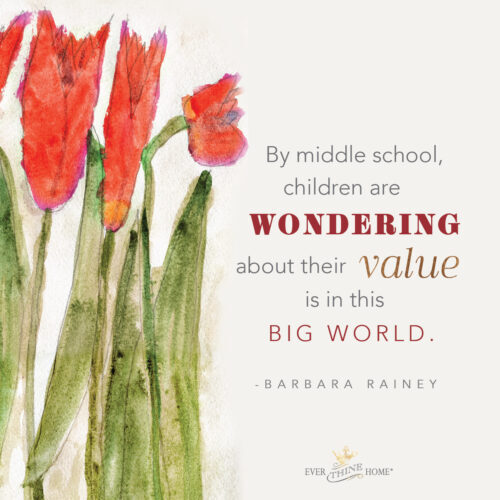
The concept of mission means “being sent” on an important task or assignment. Training your children to be purposeful about life, to evaluate how they are stewarding their talents, gifts, abilities, experiences, and passion is one of your most important tasks.
Mission is all about purpose, significance, and meaning in life. The opposite is futility, emptiness, and eventual despair. All children, by middle school, begin to ask questions like “Why am I here?” and “How can my life matter?” Even if they aren’t asking you, they are wondering about their value in this big world.
Building a sense of mission in your children means teaching and modeling two key concepts:
First, we are created to be ambassadors for Christ. 2 Corinthians 5:20 tells us, “Therefore, we are ambassadors for Christ, God making his appeal through us.” Just as ambassadors represent their homeland in another country, we represent Christ to a world full of people who need Him.
Being an ambassador means standing for Him, speaking for Him, and representing Him wherever we go. It’s about loving people with the love of Christ, sharing the good news, and explaining how they can be forgiven by God and reconciled to Him.
Even your young children can begin to understand this concept as you talk about showing Jesus to others every day by our words and our actions. We talked often about representing Jesus at school, in their jobs, and with our neighbors. Having a mission doesn’t mean your children have to move to Africa and start an orphanage, but it could.
Second, we are designed by design by God for a mission. Paul writes in Ephesians 2:10, “For we are His workmanship, created in Christ Jesus for good works, which God prepared beforehand, that we should walk in them.” The word workmanship literally means a “work of art.” Each child’s life is a one-of-a-kind, exquisite masterpiece, divinely handcrafted with heavenly fingerprints and eternal ingenuity. Their lives are hard-wired with a spiritual DNA, made in His image, to ignite good works God prepared beforehand uniquely for them to execute.
Just as we did with our children by taking them on mission trips, so it is your job as a parent to guide your children in understanding more of what God is doing worldwide, which broadens their concept of purpose and mission in life. As teens near the last two years of high school, you can start helping them dream big and find ways to develop specific talents and skills through classes, vocational school, or the best college for their interests.
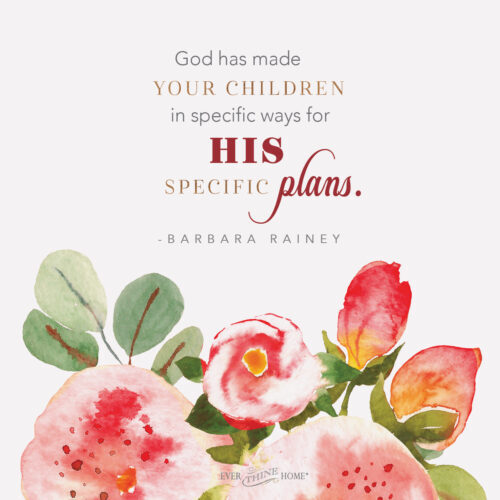
You know better than anyone how your children work, what they like and don’t like, what their strengths and weaknesses are. You are an important stakeholder in their mission decisions.
God has made each of your children in specific ways for His specific plans. Maybe your son will be a teacher, a banker, a pastor, and a husband. Maybe your daughter will be a doctor, a retail store manager, or a wife and mom. But it’s your responsibility to remind each child that they should steward the gifts and desires that God has put inside them for God’s already-determined purposes.
If all this feels a tad overwhelming that’s okay! It’s a big faith adventure. Here are a few starters on helping your children discover a God-given mission.
Evaluate your own life. Are you a person on mission? How would you describe the mission God has given you? In a world where few people consider their spiritual mission, your children need to see how this works out in your life.Pray for discernment to see and identify each child’s gifts, abilities, passions, and burdens … their “missional DNA” … as they begin to emerge. Ask the Creator for insight into His creation.Start a diary or a note on your phone for you to enter ideas and observations. Jot down little notes here and there as you see strengths and interests blossom in your children.Affirm and encourage them often when you see your children operating in the sweet spot of their gifts and wiring. Applaud them when they take initiative. Positive affirmation is especially important in the awkward years of adolescence when your teens need an outsider to speak truth to them. Don’t be surprised if they have difficulty believing it.Take advantage of aptitude testing services as children move into their middle teens and beyond. Your child’s school guidance counselor might even have access free options. And you can find a multitude of testing options online.Invite your child to dream. Ask her this question: If you could do anything in the world and couldn’t fail, what would you do and why? Keep this a regular point of conversation. At the appropriate time read her this quote from A.W. Tozer: “God is looking for people through whom He can do the impossible. What a pity we plan only things that we can do by ourselves.”Encourage and affirm every step of faith, large or small.Teach your children how to process failures. Don’t be too quick to rescue them either. Failure is often one of the best tutors in each of our lives.Don’t let their dreams scare you! Our oldest son is our child who spent a year in Estonia. When he came home from college during his junior year to tell us he wanted to go introduce Estonian students to Jesus Christ, we had to get a map out to see where it was on the planet! Many conversations and months later, we found ourselves at the airport as he and five other friends boarded a flight across the globe without a return ticket. It was a life-changing experience for everyone, including his parents and siblings left behind who watched and prayed and were challenged by his experience.Pray with and for your child that he will fulfill God’s mission for his life.Read Matthew 28:19-20—the “Great Commission” of Christ—and discuss what it means for our lives. Note the context of this passage. Jesus gave this commission as He spoke His last words to His disciples: “Go therefore and make disciples of all nations, baptizing them in the name of the Father and of the Son and of the Holy Spirit, teaching them to observe all that I have commanded you. And behold I am with you always, to the end of the age.”Assign one of your children to read and give a book report to the family on Katie Davis Majors’ book, Daring to Hope. Our son who spent a year in Estonia later took his 14-year-old daughter to Uganda with Compassion International and visited Katie’s ministry and school. He is requiring all four of his daughters to read Katie’s books, including her first, Kisses for Katie. Mom and Dad, tighten your seat belts … this is quite a story by a remarkable young lady.Application
Plan a date with your spouse to talk for 30 minutes about how you can help identify and define God’s mission for each of your kids:
Discuss this Ethiopian proverb:“The feet take a person where one’s heart is.” Do any of your children have any dreams that scare you? If so, talk about why. Pray that your children would always hear God’s voice above any other and have the courage to follow it. Pray that you would be willing to accept and encourage the mission that God is calling them to.If your children are too young to read Katie Davis Majors’ books, use your evening date with your husband to read one of her books together. Take turns reading aloud perhaps.Begin naming specific strengths, preferences, and likes in each of your children.Schedule a regular date night with your spouse to sharpen your inventory of your child’s life.Discuss how you can better develop your child’s gifts, talents, and passions as her parents.Parenting is full of twists and turns and hard challenges we can’t begin to imagine when our first child arrives in our arms. But God is always ahead in your future and in your child’s. Focus on building strong relationships, character, a secure identity, and a sense of mission and purpose. That’s your assignment. God will guide you and your children every time you ask Him.
Remember He loves your kids more than you do!
The post Building a Sense of Mission in Your Children appeared first on Ever Thine Home.
June 17, 2024
Building Emotional Security in Your Children
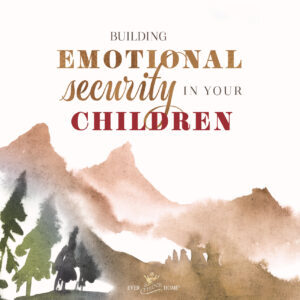
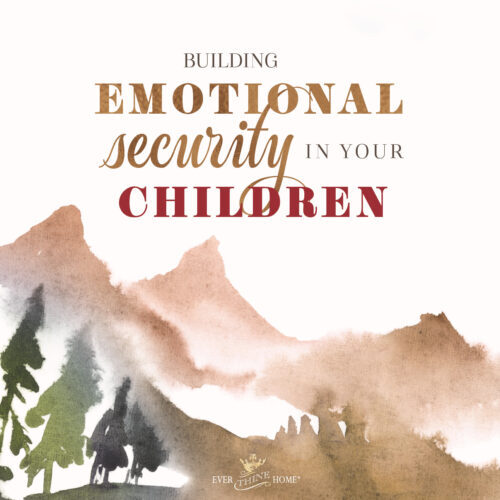
I grew up in a family that was secure and stable, and I knew I was loved. I never feared my parents would divorce or leave us. They cared for us, provided for us, and taught us many valuable lessons about life.
But what my head knew was true I did not always feel. My parents both grew up in families that experienced significant losses—the death of a child, the relentless hurtful attitude and comments of a mean father-in-law, the dissolution of a marriage, and difficult life struggles during the depression and World War II. As I looked back, it’s remarkable that my parents raised me and my brothers as well as they did.
I remember I often felt insecure about myself by the time I was nearing my teen years. I also remember working hard to please my parents. I wanted to make sure my dad had no reason to be angry with me. I became stoic and subdued, never getting angry, but not expressing much happiness, either.
I did not laugh often, and I rarely cried. All those emotions were a part of me but were hidden deep within as I sought to please others. As a teenager, I didn’t know who I was or how I fit in. I became increasingly shy, timid, reserved, and self-protective.
As a 19-year-old college student, I understood the gospel for the first time, and my sense of self and purpose changed dramatically. As I grew in my faith, I learned more about the importance of emotional identity. We are made in God’s image, which means we are created with emotions, intelligence, gifts and talents, and a spirit like His. Our identity is a composite of these facets of our personhood.
The emotions of our hearts are a reflection of God Himself.
In the Bible we see God in three persons express Himself in all the ways we do.
· He creates (“Let us create …” Genesis 1:26).
· He gives (“… for God so loved the world that He gave …” John 3:16).
· He loves (“God is love …” 1 John 4:8).
· He grieves (Jesus “grieved at their hardness of heart …” Mark 3:5).
· He hurts (“He was despised and rejected by men, a man of sorrows and acquainted with grief …” Isaiah 53:3).
· He longs (“Jesus said, ‘How I longed to gather you together …’” Matthew 23:37).
· He angers (“I was angry with my people …” Isaiah 47:6).
· He delights (“… the Lord took delight in doing you good and multiplying you …” Deuteronomy 28:63).
· He names (“To the one who conquers … I will give him a white stone, with a new name written on the stone …” Revelation 2:17).
· He laughs (“He who sits in heaven laughs …” Psalm 2:4).
Our identity as humans, who are made in His image, is supposed to come from God our Creator. A child’s identity, his created uniqueness that sets him apart from every other human, will only be as strong as His understanding of who he is in light of who God is.
Therefore, how a child feels about herself—loved or unloved, competent or incompetent, empowered or shamed—will either support or inhibit all natural giftedness, talent, and intelligence. Emotional health also strongly supports the development of your child’s character and relationships.
And here’s the other important lesson I learned about emotional development: For children to feel secure and safe, for teens to develop a confident sense of identity, for your children to become emotionally healthy adults, they must know they are loved and cared for by those who have the power to do them good. In the formative years, this responsibility is initiated and nurtured by parents. Children must learn love at home from mom and dad.
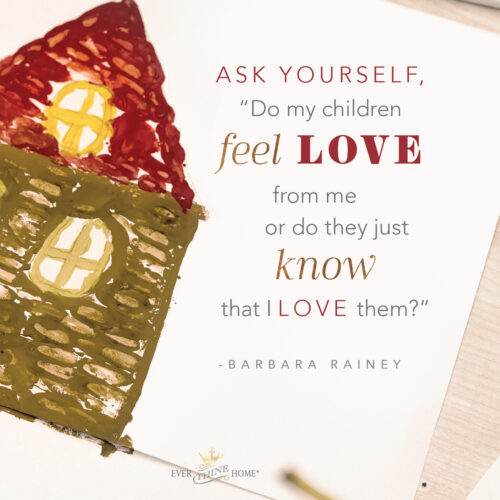
From the seconds immediately following birth, children either respond in security to the warm welcome embrace, kisses, and love they are given by their parents or they respond in bewilderment and fear, building early defense mechanisms to protect from a lack of parental love and presence. Attachment to mom and dad are identity-shaping experiences.
But this nurturing doesn’t end when your little ones grow out of diapers. It is your responsibility to nourish the emotional development of your children, which in turn shapes their identity throughout their toddler, elementary, and teenage years.
I knew this by the time I entered the parenting process with my own children. So I worked hard to foster closeness and openness: snuggling on the couch reading books, encouraging their expressions of emotion, welcoming creativity in spite of the messes. But as our children got older, I saw that I was often reacting or retreating out of fear because I didn’t know how to nurture emotional health in teenagers.
I recognized how it was easy for me to kiss the little ones, to stroke their faces, and cuddle them. But it was much harder for me to do that with my now 13-year-old daughter and 12-year-old son.
Our oldest, Ashley, noticed and made little snide comments about how I was spoiling the younger ones, giving them too much attention. I remember thinking at first, “It’s okay that I am not as close to the older ones. That’s just who I am. And besides Dennis is very good with our teens.” I figured I could concentrate on the younger kids, he could concentrate on the older ones, and everything would just be fine.
Eventually, I understood our daughter’s criticisms were her way of letting me know that she was not getting from me the affection and nurturing she still desired and needed. I made a commitment to myself and to the Lord that I would begin to express more affection and more emotional closeness as best as I could with my teenagers. I remember intentionally going into Ashley’s room to hug her really tight, even though it felt awkward to me because I had not received similar affection when I was a teenager.
I also realized that by meeting her needs emotionally at home, I was helping to protect her from getting her emotional and security needs met from others, especially boys. It was like a light went on and I understood that if she didn’t receive love and security from both her parents, she would have a vacuum in her heart that she would fill in unhealthy ways.
Moms and Dads, you need to ask yourself, “Do my children feel love from me or do they just know that I love them?” There is a big difference. Your children need to feel loved; both sons and daughters need to feel cared for in a real emotional, intimate way that only comes from appropriate affection and physical closeness from parents.
Speak to yourself. Tell yourself today at age 35 or 40 or 45 to step up and move into the emotional space of your children, even if it is uncomfortable. If you didn’t experience this as you grew up, tell your kids. They will welcome your admission with grace and a willingness to figure it out together.
Our goal as parents is to teach our children to feel and name their emotions, to help them learn to identify what is driving them, shaping their decisions and reactions. Then we teach, instruct, and train them to express those emotions in healthy non-offensive, non-hurtful ways.
We’ve all seen the tragic, destructive actions of neglected, unloved teens who tried to shape an identity and a purpose by aligning with violent groups online. Feeling loved unconditionally tells a teenager his unique personality and gifts, his identity, are good.
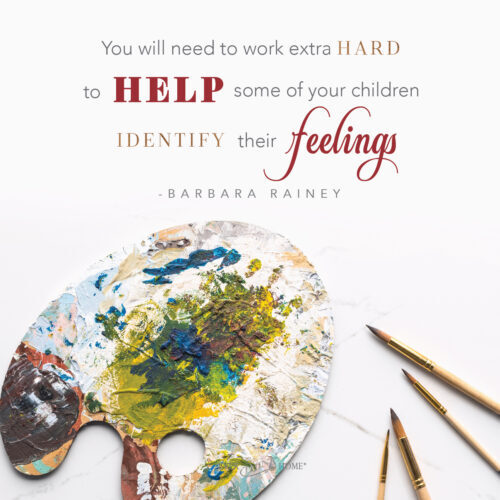
Be alert as parents
When I was 40, I had corrective heart surgery. A couple days before I went to the hospital we asked our two youngest to clean up their room. As we came back later to then put them to bed, we noticed that seven-year-old Deborah had stuffed everything under her bed, which wasn’t the way she usually cleaned up her things.
The Spirit of God prompted one of us to ask her how she was feeling. She said, “I’m scared.” We asked, “What are you scared about?”
She said, “Well, I am sad.”
“What are you sad about?”
Then she began to cry and she said, “I’m afraid Mommy is going to die.”
Because we wanted to guard their fears, we hadn’t talked about the severity of the surgery with our children. But Deborah perceived the uncertainty of the circumstances and became afraid. Her way of dealing with that emotion, stuffing everything under her bed, is a picture of what we do with our feelings. All children need training and practice finding, naming, and properly expressing their emotions.
With some children you will need to work extra hard to help them identify feelings. Several of our firstborn grandchildren are naturally reserved, intelligent, follow-the-rules kids who value factual thinking. Ashley, mother of our oldest grandson Samuel, decided he needed to learn to recognize and name his emotions.
She announced to him and his brother James, a natural feeler, that she was going to start asking them every day after school to describe one positive and one negative or unpleasant emotion from their day. Samuel said he didn’t want to. It sounded hard, he stated. James enthusiastically said, “Oh this is going to be easy. I got this!” What a dramatic difference in our emotional makeup as people!
The exercise only lasted a few weeks, but even in that short time frame, Samuel learned to look within and describe his daily experiences at school by how he felt. Identifying positive basic emotions like happy or enjoyable proved to be reasonably easy after a while. One day he also tried to summarize his day as normal, but Ashley told him “normal” wasn’t an emotion and to try again!
It’s a challenge to help children learn healthy ways to express their emotions. One night we had a family discussion after dinner to talk about anger. With eight broken, sinful people living in a four-bedroom house, we saw lots of anger in all its various forms! So we asked the kids, “What do you feel like when you are angry?” They answered, and we wrote their answers on a poster board:
· I feel like screaming.
· Like out of control
· Like hurting someone; mad; hitting something
· Exasperated
· Verbal vomit
· Like tearing up things
Then we asked, “What are the kind of things that make you angry as a child or a teen?”
· When you feel left out or excluded by a family member
· When you get hurt
· When people make fun of you
· When people cheat
· When people are being a pest or picking on you
· When you are disciplined
· When people use my stuff without asking
· When people don’t give us what we want
· When people don’t pay attention to what we are saying
Then we said, “Want to know what makes us angry as parents?” I don’t think they actually cared, but we told them:
· When children disobey
· When children ignore what they are being asked to do
· When we are misunderstood by each other and other people
· When we are hurt
Our anger problems were not solved that night. That wasn’t the goal. Instead, we hoped to simply help our children understand that the feeling of anger is a normal emotional response. The problem is how we often express anger—that’s what usually turns it into a negative, sinful situation.
We spent hundreds of hours correcting our children’s inappropriate, hurtful ways of expressing their anger, hurt, disappointment, and fear. Thousands of times we said things like, “You may not hit your brother when you are angry at him.” … “You may not scream at your sister.” … “You may not break something when you feel overlooked.”
Human emotional expressions are never totally pure, righteous, or good the way that God’s are. Our brokenness and depravity compromise our every intention. It is why we so desperately need the power of God’s Spirit within us to make our marriages work and to raise our children in a healthy way.
Remind your children as often as necessary to express respect for others, including their siblings, for we are all made in God’s image. We all have dignity before Him. Respecting one another’s dignity is crucial in building a stable identity that says, “The way God made me is good.”
Children want and need feedback from their parents, especially as they get older. You are their measuring line. You are their report card. You are their most important cheerleaders who must celebrate every good decision, rejoice with all right attitudes and reinforce all the good they choose to embrace.
Listen to their hearts, their emotions. Children want to be heard and understood, not lectured. Make your home a safe place for self-expression, for processing the hardships of life, for learning emotional boundaries. And daily reaffirm your love and acceptance of each child, even when they make mistakes. Model God’s unconditional, grace-filled love in your home.
Application
Take at least 30 minutes with your spouse to talk about how you can improve intentional relationship building with each of your kids. Start by reviewing your families of origin and how emotions were handled or not handled in your childhood. Talk about how that impacts your parenting today with your children. Then talk about changes you want to make overall or with each child.
Then plan a time with your children. Describe your day to the family using one positive emotion and one negative emotion to tell how you felt about something good and something that was hard. Start practicing what you want to pass on. You might focus on this for a week or a month like our daughter did with her sons.
If your children are upper elementary to late teens try getting them more involved like we did with our kids when we discussed how anger feels.
· Have your family brainstorm healthy and unhealthy ways to express the emotions they name. And write them down in two columns on a poster board which makes each persons’ contribution feel important and easy to see and remember.
· Do the same with other emotions like anger or gratitude (the feeling of being appreciated). Ask them to share how anger feels or how being appreciated feels and again write it all down for emphasis.
· At another family time ask everyone, “Is it easy or difficult to use our emotions wisely and honorably? The answer should be, “It’s hard.” Then ask, “Why?” Truthfully it is impossible for any human to use them as God intended. Then talk about how we need God and the power of His Spirit to help us do what we cannot do on our own.
These are great opportunities. These times with your kids will not magically make them all perfect kids, but they will guide them into understanding their emotions more than the did without your help. And the conversation gives all of you language to use in your everyday interactions.
This is a huge topic where we all need a lot of help. If you have read to this point you deserve a hearty congratulations! I wish I had known half of this a lot earlier in my parenting journey. I pray it helps at least one of you equip your children toward healthy emotional well-being.
I’d love to hear how those of you in the throes of parenting young kids are handling anger and emotions. Or if you’re in the empty nest: What did you do to build emotional security in your kids? What do you wish you had done?
The post Building Emotional Security in Your Children appeared first on Ever Thine Home.
June 10, 2024
Building Character in Your Children
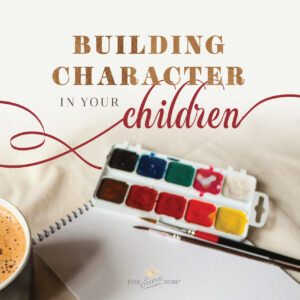
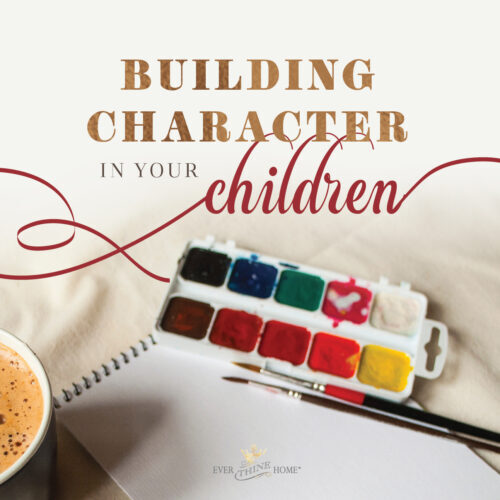
Recently I was talking with some parents who said they had just had a rough evening with their teenage children. Their kids were not afraid to push back against Mom and Dad, to question every single decision, to compare them with what they perceived their friends’ parents were doing, and to express how they feel about everything.
Oh, how that brought back memories. Our kids were the same during their adolescent years. To them we seemed like the strictest parents on earth!
Teens want their parents to know how hard their lives are and how miserable parents make it. They have little to no compassion on how difficult your job is, nor do they have any appreciation for how much you love them and desire the best for them.
Whether you have teens today or you will in a few short years, what makes parenting so frightening is the knowledge that our words, actions, and decisions will mold these living beings’ eternal souls! We will have the greatest influence on our children for good or bad.
This is especially true for those of us who are concerned with molding the character of our children, which is a long, slow, difficult process. And the victory is for the parents who persevere to the end, who don’t wilt under their middle schoolers’ or teens’ withering verbal attacks, who don’t make decisions out of fear but faith, and who understand the long journey is often difficult but worth it in the end.
Parents can’t change their children’s personalities, physical characteristics, mental capacity, or length of days, but you can shape their character. You have the privilege of cooperating with the Creator of the universe in uncovering, naming, and nurturing into bloom all the possibilities God planted in your children.
The power of naming
Once there was a boy. Orphaned at an early age, then adopted by his uncle and aunt who lived on a modest little farm in the Palancar Valley, his was an ordinary life. Like the nearby village children he spent much of his time outdoors helping on the farm, tending the garden, or caring for the animals.
In his mid-teens though, life changed unexpectedly and very dramatically for young Eragon. Chosen and called to become a warrior for his people, his initial response was retreat. He wasn’t worthy. After all, he had no parents, no lineage in the ruling class, no name of his own. Who would follow him?
But the call was unmistakable. Branded on the palm of his hand was the insignia and it wouldn’t wash off.
Eragon’s journey through four excellent novels by Christopher Paolini is a multi-layered story of growing up, both for this boy and for those who parented him along the way. Woven through the series is a supporting theme on the power of names.
As Eragon grew into his role as a leader, he became Eragon Shadeslayer to the people because he had saved them from the evil “shade.” Every time that name was spoken it reminded him of his responsibility to continue to protect.
If you have followed my blog at all you know we make much of the names of Jesus at Ever Thine Home. He has as many as 300 names, which tells us His person and character are not simple and one dimensional.
I wonder if we miss the benefit of being named by important character qualities? What if you began to occasionally call your son by a quality you see in his life, like James the Compassionate or name your daughter Susan the Brave?
Even if we don’t develop this practice in our modern world, this does highlight the importance of building character in our kids. More specifically, we ought to consider naming the character traits we seek to build into our children.

Our own character is also malleable
Character is an invisible collection of traits that informs our thinking, resulting in good healthy choices or bad unhealthy decisions. Character governs and guides each person’s moral and ethical choices in any given situation. Summarized simply, character is defined by a heart that beats for God or by a heart fluttering for self.
Hebrews 6:17 describes “the unchangeable character of His purpose” (Hebrews 6:17). God’s character is unchangeable. But ours is malleable.
This is great news for parents! Your character is still moldable, as is your child’s. You can still grow and develop, and your children can too!
When I was in the thick of raising our six children, I faced an endless stream of sibling rivalry, strong wills, selfishness, resistance to instructions, and daily childishness. Unfortunately, this struggle often revealed a great lack of patience in my heart. Many times I had a desire to get even with these little people who constantly disrupted my plans and disordered my order. My children, I realized, had a way of exposing my own brokenness, my own character flaws.
Then one day I found a verse that promised me something I needed badly. 2 Peter 1:3-4 says, “His divine power has granted to us all things that pertain to life and godliness … He has granted to us His precious and very great promises, so that through them you may become partakers of the divine nature …” Those last two words stood out as if spotlighted. I knew a divine nature or divine character was what I needed because mine was anything but divine!
How could I model the kind of behavior I wanted them to imitate? As a good friend of ours said, “You can’t impart to your kids what you do not possess.”
I could instruct them all day long about being patient, but if my children saw and experienced an impatient and angry mother, that behavior is what they would adopt. That is who they would become.
By focusing your mind and heart on God’s Word, asking Him to change you, you too can become a partaker of His divine nature. Patience is a character quality of God’s and it can be yours. You can change bad habits and grow good habits so that your children are watching a parent you want them to emulate!
Character for parents and children is not just doing the right thing, but also doing the right thing in the right way. And that is why we need God’s help every single day!

Where character grows best
We all want to raise safe, happy children who become safe, happy adults. But God knows none of us will depend on Him if we don’t need Him, so He allows difficulty—not getting chosen for the team, the rejection of a friend, the pain of a broken bone—to remind us to talk to Him and trust Him with our lives. Character grows best in times of testing and hardship.
Walk with your child in those hard times and help him know how to respond in a way that pleases God instead of a selfish way. Encourage your children every time they choose His way. Call out and name the character qualities that are good, right, and pure.
In this world of enormous uncertainties children and their parents need stability. Choosing to follow His plan, teaching your child to be wise and not a fool, is the one way that will endure no matter what the future brings.
Here are 10 character qualities we sought to build into our children. This is part of a longer list that we kept adding to over the years. It is closely tied to the Ten Commandments and other instructions in the Bible:
Love: To love God, love ourselves so as to care for His temple (our bodies), and to love others. Respect: To respect God and His Word and respect other people, even those with whom we disagree, as those also are made in God’s image. Wisdom: To have discernment. To know who to trust or not trust, what to believe or not believe, how to act or respond appropriately in any given situation. Truth: To have integrity and honesty in speaking, writing, and creating without deception or manipulation. Humility: Not to think more highly or lowly of oneself, but to live in light of the truth that God sees, hears all, and knows the depths of our hearts. Teachability: A willingness to learn and admit failures and mistakes throughout all of life. Faithful: To be dependable, hardworking, trustworthy. To be someone who keeps his word. Generosity: A willingness to serve with kindness, give of your life, your gifts, skills, and talents for the sake of the kingdom of God on earth. Gratitude: To practice thanksgiving as a way of life in good times and hard times, acknowledging it is God who orders our lives and circumstances, and He never makes mistakesExcellence: As a child of the king remembering who you belong to, who you represent, who your life must ultimately please, for to Him alone will you give an account one day.Application
If you’re married, grab a few minutes with your spouse this week to talk about this issue. If you’re single, talk these through with a friend who can help hold you accountable to your parenting goals.
I’d encourage you to start your own list of character qualities you want to build in your kids. And make it practical. For instance, if you put “gratitude” on your list, how do you want them to express that? Do you want them to learn to write thank-you notes? To always say “thank you” verbally? To practice thanking God when they pray?
If you have trouble thinking of character qualities, think about qualities you saw in a teacher, your parents, or people you admire who are living wisely. What do you want to see replicated in your children?
Choose two character traits from your list and make a practical suggestion on how you might implement that in day-to-day living.
Identify and confess an area that you as a parent need character transformation. Pray and ask God to give you His divine nature more and more each day.
It helps to have a real list to look at to remind you what your parenting goals are. You may not fully execute all of them, but without goals you will accomplish far less. And be sure to save the list in a safe place and keep adding to it as you grow as a parent.
May God guide and bless your efforts to invest wisely in your children’s hearts!
The post Building Character in Your Children appeared first on Ever Thine Home.
June 3, 2024
Building a Relationship With Your Children
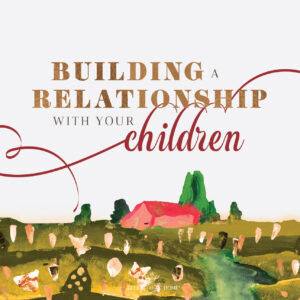
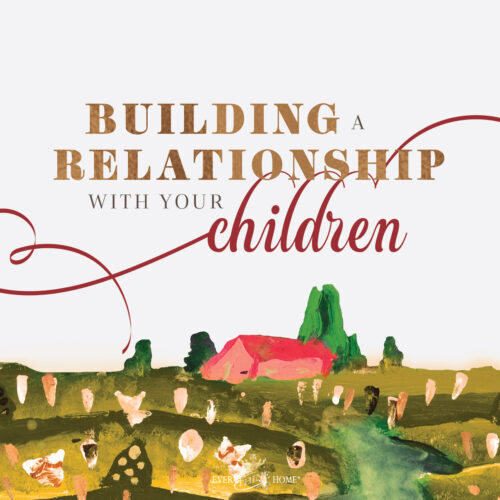
Note from Barbara: Being a mother has been my greatest privilege as a follower of Christ. It was also my greatest challenge! Teaching and helping and modeling and training children to grow into responsible adults with their own faith is not a small assignment in any generation.
Now that they are all on their own, I delight in watching my kids and their own children become who God made them to be. The relationship we began from their infancy continues today though in very different ways.
This post is the beginning of a four-part series which highlights four of the most important qualities a parent must impart to their children. The importance of your relationship with your children is the beginning and the bedrock of who they will become and whose they will become. I hope you enjoy and are encouraged by these words.
Did you know we were made by God for relationships?
Sounds obvious, doesn’t it? But it’s easy, especially in America, to think that life is all about us. When you read Scripture, it quickly becomes apparent that we were created for much more.
In the Garden of Eden, God made us like Himself, in His image, so we could have a relationship with Him, unlike the animals who could be enjoyed but not known. God made us to know and be known, discover and be discovered, and become all He intended. Humans are created with the ability to see, hear, smell, touch, and speak to one another. God also created us with cognitive and emotional capacities to be loved and to love in return, so that we can enjoy relationships with others. 1 John 3:11 tells us, “… this is the message you have heard from the beginning, that we should love one another.”
Even though we know this truth as parents, we often fail to address it as we raise our kids. We teach them how to behave well outwardly. We quickly and necessarily correct inappropriate behavior. But do we purposefully teach and train them how to love biblically and develop relational life skills?
The family has always been God’s first and best classroom for learning how to relate to others. Home is where children can be loved and can learn to love, where they learn that selfishness and love can’t coexist, and what to do when they hurt others and fail to love well.
Love is the basis of relationships.
A relationship is like a highway with one or more lanes going in each direction. On one side of the median is the love you initiate to your children; the lane in the other direction is their response back to you. It’s never too late to start building a stronger relationship bridge with your children and keep its lanes, entrances, and exits maintained and strong.
This relationship road, complete with bridges that span our many differences, will give you the right of way to:
Give unconditional love daily, repeatedly.Comfort in times of failure, loss, and sickness.Speak words of truth when friends reject, tempt, or criticize.Lead your children to Jesus over and over and over.Answer the thousands of questions asked seemingly every week, or with some kids every day!Now for some how-to’s!
Here are three practical ways to start building relational roads and bridges to your children with the result of deepening bonds with one another.
Value your children as gifts from God.One of the most important ways to love each child’s heart is by receiving them with thanksgiving to God over and over again, and by voicing that gratitude in each child’s presence using his or her name. “I’m so thankful God gave you to us, Max. What a delight you are!” Don’t just use their full name when they are in trouble.
The Psalms declare, “Behold, children are a heritage, an inheritance, from the Lord, the fruit of the womb a reward” (Psalm 127:3).
Loving is easy when they are smiling, happy babies, sweetly singing preschoolers, well-performing school-aged kids, and successful, well-liked teens. And love is always easy when your children are sleeping peacefully and safely at home. Ahhh. Even teens are easy to love when they are asleep!
But love isn’t so easy when children cry all night, refuse to get in the car seat, hit others at school, don’t try hard enough in middle school, rebel against all your standards, scream and yell that you don’t love them, and make life miserable for everyone in the family. We had kids who weren’t easy to love … we remember the phone call from a teacher saying that one of our teens had been caught cheating in class … or the time a child yelled, “You are the meanest parents ever!”
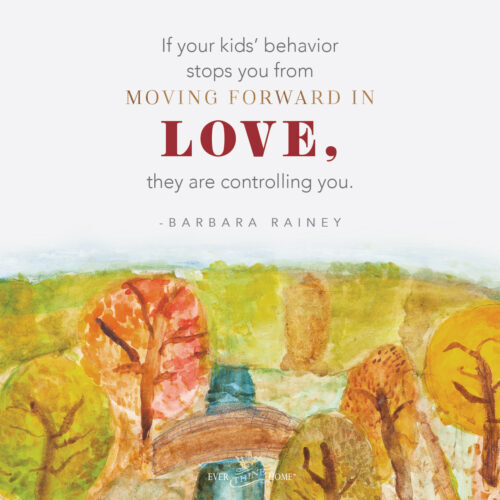
Consistent, unending love is dependent on choice … daily choosing to love regardless of how you feel, choosing to believe the good potential you know God put in your children, and calling out that goodness. Choosing to love means:
You choose self-control when you’d rather yell.You choose to tell them you love them every day even when you don’t feel like it.You choose to thank God for a child’s taste preferences, aversion to textures, interest in cooking rather than basketball, and a thousand other surprises you never expected to see.You choose to express affection when your children act disinterested because you know it’s important. Even when they push back or refuse to hug you in return.You choose to thank God over and over for the gift of each child to you and your family no matter what. Remember God does not make mistakes.If you let your children’s negative actions or behavior stop you from moving forward in love, they are controlling you. The good qualities they need you to recognize, name, and call out get lost. It is imperative that you, the parent, remain more mature, more dependent on God, more prayerful, more committed to loving well than your children. You set the tone.
Pursue your children.Pursuit is action. It’s initiative and movement. The demonstration of love is a commitment to pursue, a refusal to quit. Pursuing love finds a way to build a bridge in the middle of a battle, crisis, or impasse.
One of the ways that Dennis pursued our children was by dating each one individually. Because he traveled a good bit, he intentionally took them on “dates” or fun outings. By the time they were teens they had a decade of special times with their dad. These were great times to have fun together and great opportunities to call them up to excellence and remind them of who they were and who they belonged to. These experiences built a relational road that was invaluable during the adolescent years.
Set an achievable goal of two dates a year per child as a starting place. It’s the simplicity of positive, focused time together with purposeful words of affirmation spoken eye-to-eye that makes it meaningful and unforgettable.
For me, as a full-time stay-at-home mom who had more time than I sometimes wanted with my kids, I chose natural one-on-one times with them to invest in our relationship—running carpool, eating meals, driving to lessons, taking them to the orthodontist and other appointments, etc. I tried to make the time intentional by asking questions and finding ways to get to know this one child apart from his siblings.
Here are some questions to try:
What was hard about your day?What was the “high and low” of your day?What is something new you learned today?Who was kind to you today? Who were you kind to today?Did God show you something new about yourself or someone else today?Dennis and I also made it a point to name at least one affirming quality a day to each of our children, even if it was just a reminder of our unconditional love. Parents are generous with our corrections, most of which are needed, but our kids need to hear us name what is good, too. With our adopted child we often reminded her, “Ten times out of ten we would choose you all over again!” With our child who experienced a physical disability, we continued to express belief, “We believe God has a great plan for you.”
Why? Because, belief keeps hope alive, especially during the teenage years. Many teenagers struggle with self-doubt and wonder if God really does have a plan for their lives. Name all that you see that is good to help them remember and not lose heart.
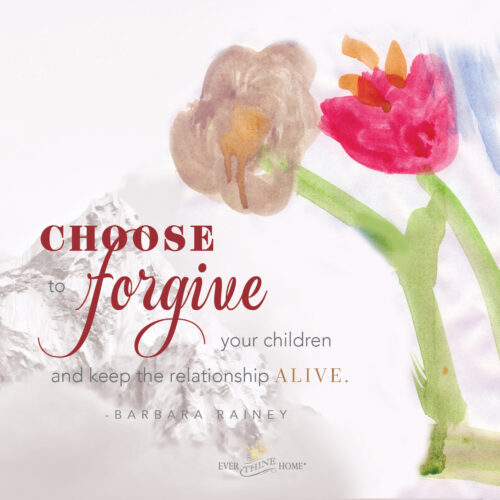
In this way parents are like God to their children. We imitate, demonstrate, and model what God did for us. Over and over and over. In the process we grow a relationship with each child, and our relationship with God grows exponentially deeper as we desperately depend on Him.
At the same time our children begin to take baby steps toward their own relationship with the Creator God who formed them, parent and child practice giving and receiving forgiveness.
Paul writes an invaluable challenge from God in Ephesians 4:32, “Be kind to one another, tenderhearted, forgiving one another, as God in Christ forgave you.” Forgiveness is the bedrock of a relationship.
Do our kids deserve our forgiveness? Many times we feel the answer is no. But God is our model. He refused to let your rejection of Him, your offense of His holy standards, your running away from Him, your decisions to do life your way as if you were smarter than your Creator, stop His love from pursuing you.
When you truly forgive your children, you don’t let their rejection, their angry words, or their decision to deliberately disobey stop you from loving and forgiving them. You give up the right to be angry and withdraw from them or lash out at them. Forgiveness frees you from being imprisoned in resentment and gives you the confidence to come across the bridge toward him to re-establish and experience a relationship with them.
Forgiveness is a choice. When you choose to forgive, you keep the relationship alive.
Conflict is normal in all families. Homes that don’t have conflict don’t have real relationships with real people. We are all broken people—selfish moms, angry dads, and children who are just like them … and so we hurt one another. It’s why true forgiveness is the ultimate maintainer of bridges … God to man and parent to child.
Application
Plan a date with your spouse, even if it’s an after-the-kids are-in-bed living room date with two cups of decaf or tea. Find even 30 minutes to talk about these questions and how you can improve intentional relationship building with each of your kids. If you are a single parent I hope you can find another mom or dad in a similar situation who you can talk to and share ideas, solutions, and prayer for one another. Parenting is best done with a partner.
Discuss where your relationship currently stands with each of your children. Are you satisfied with each one, or do you see room to grow?Which of the three relationship-building ideas noted above is the hardest for you with each child? Which is the easiest with each child?What is one practical way you can commit to build a relationship with each of your children this week? Will it be a little date? Asking a few key questions? Speaking a positive affirmation to each child each day?Help each other follow through with your commitments with gentle reminders and big encouragements when you see each other pursuing your children in the next few days. All these little investments add up over the years.
Building a relationship with each of your children will pay off not only now but also in the years to come after they leave home and live on their own.
Parent-child relationships are the first and most lasting work you will do. They matter!
The post Building a Relationship With Your Children appeared first on Ever Thine Home.
April 8, 2024
Eastertide Week Two: Remember the Resurrection

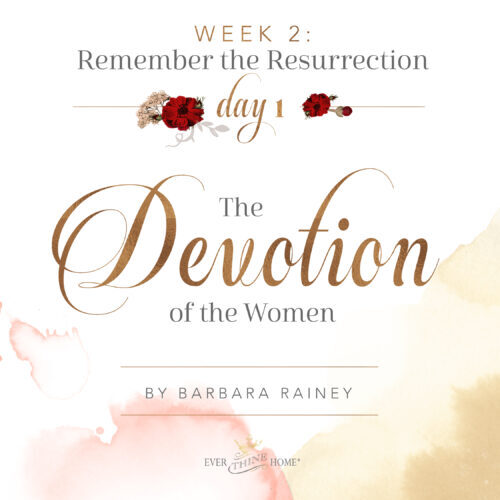
Day 1: The Devotion of the Women

As we start this new week looking at the Resurrection there are so many details that must be noticed by our hearts for our faith to grow into worship. Three appearances are recorded on the first Easter Sunday. It’s dawn and time to peek into the empty tomb!
Let’s gaze at a few of the many details from Resurrection morning with the clarity of hindsight (it’s our default human vantage point) and the Spirit’s illumination. Enter the story. To be changed by the miracle of it, we must keep it with us … closely, intimately, as a treasure.
After Saturday’s Sabbath had ended at sundown, a group of women “bought spices, so that they might come and anoint Him” (Mark 16:1, NASB). After their meeting time and place was set, they went to bed. Exhausted and sleep deprived, yet again this night they slept little and were awake well before dawn. It had been only two days since the horror of the Crucifixion.
As the first rays of sunshine crested the horizon “very early on the first day of the week” (Mark 16:2), its warmth touched a group of women walking together, heads and arms wrapped in shawls to keep the morning’s chill away. The four Gospels name them in various groupings. They were Mary Magdalene; Mary, the mother of James; Salome; Joanna; and “the women who had come with Him out of Galilee” (Luke 23:55, NASB).
But … wait … why were no men present?
Was it because it was the woman’s duty to care for the bodies of the departed? Or were the men kept away by the facts—Jesus was dead and everyone knows death is final. End of story.
Jesus was like family to these women! It was unthinkable not to go to the tomb because women are devoted to their families. They went to be near the One they loved, “taking the spices they had prepared” (Luke 24:1), a beautiful act of devotion.

A pause on our journey back to the scene, and a question: Have you been willing to go near to Jesus even when He seemed dead … or silent … or unresponsive to you? What do you think of these women who did not hesitate? Don’t rush past this moment.
Now look again at the scene of the tomb … more closely now … because of their love for Jesus, the women dared to go near … and …
… they were the very first to discover the tomb was empty (John 20:1).
… they saw an angel or two (Matthew 28:2, Luke 24:4).
… they were the first to hear the news “He has risen, just as He said” (Matthew 28:5-7, NASB).
… some were the first to see Jesus alive (John 20:14-16).
… they were the first to believe and worship Him (Matthew 28:8-9).
Here at the tomb we see Jesus honor His female disciples who were quick to recognize and believe the impossible. Their deep love and their eager, welcoming faith was abundantly rewarded.
Then they ran to share the good news!
Belief in God is supremely important to Jesus. It’s what He longs for from us. Though we waver often between belief and unbelief, Easter reminds us to always lean toward belief even if we feel crazy doing so, just as believing Jesus was actually alive felt crazy on that first Easter morning.

God likes it when we choose to go to Him, to be near Him. James 4:8 tells us, “Draw near to God, and he will draw near to you.” Will you take steps toward Him?
Another profound truth from the death of Jesus is this: The end of the story is never the end of the story. You may be facing a dead end in your life, but the Resurrection is a reminder that God knows how to bring life to what appears to be dead.
Choosing to believe keeps the door open to what God wants to do. Choosing to believe is one way we remain awed by Jesus every day.
Remember the Resurrection and its wonders, and sing to the LORD,
“See what a morning, gloriously bright
With the dawning of hope in Jerusalem”1
For Eastertide reflection:
1. Since the Resurrection is the pivotal moment of history, why are Christians in the days after Easter back to normal as if nothing revolutionary happened? Why is Easter just an event we celebrate, with any wonder or awe we feel evaporated by nightfall? What are your thoughts about this?
2. Are you open to remaining stunned by this incomprehensible miracle? How can you remain awed by Jesus even as you return to ordinary living?
3. How can you go near Jesus today? He longs for you to come to Him. Don’t forget He rewarded the women who went near even when they thought He was dead. Why do you hesitate? This would be a good topic of conversation with your Savior today and this week.
In the historical church, the season between Easter Sunday and Pentecost is called Eastertide, a festive season for celebrating the risen Christ. This begins the second week of devotions we’re offering to our paid subscribers, so look for the next one tomorrow. If you’re a free subscriber, click here to join Barbara’s Friends & Family subscribers and get access to the full series.

We hope you will read these devotions meditatively, learn more about Jesus, and continue to savor the Savior who gave His life for you and rose from the grave. May you celebrate the Resurrection longer this year!
ENDNOTES
1Lyrics from “See What a Morning,” by Stuart Townsend and Keith Getty.
Have you considered the role women played in Christ’s resurrection? What are your thoughts about why they were there and why they were the first?
The post Eastertide Week Two: Remember the Resurrection appeared first on Ever Thine Home.
April 1, 2024
Eastertide Week One: Remember the Cross


Day One: The Incarnation, Easter’s Birthplace

Yesterday we marked the anniversary of the most miraculous moment since the dawn of time: the Resurrection of Jesus Christ.
How would you evaluate the experience? Not your church or pastor, but your own heart? Were you distracted by the to-dos for your Easter brunch? Did you allow yourself to enter the experience of what actually happened to Jesus over those days in A.D. 33? In short, were you awed in any way?
Today, Monday, schools are back in session and the normal business of life has resumed. But is there any afterglow? Yes, there are tasks to be done, but while you are busy are you remembering the wonder of the cross, the stunning realization of the Resurrection? Or have you quickly forgotten because it all feels like the same every year?
On the day after the first Easter, the circle was small that knew about the Resurrection of Jesus. And even those who knew were probably living in a mixture of shock, unbelief, wonder, and joy as the memories of the horror of the cross were still so fresh. Psychologists use the word “ambivalence” for this mash of opposing emotions. The disciples couldn’t make sense of it all. It would take a while.
Neither did they initially see the connections between the Old and New Testaments, between the Incarnation and the Resurrection, or between the sacrificial blood of Christ and the redemption God wants to work in our everyday lives. Some remembered Jesus saying both, “As Moses lifted up the serpent in the wilderness, so must the Son of Man be lifted up” (John 3:14-15) and “… take up your cross daily and follow Me” (Luke 9:23, New Living Translation), but it was still confusing and hard to understand. The associated suffering was unpleasant. It is for us as well.
We do understand Christmas and find it pleasant—a much happier holiday emotionally. So let’s take a peek into the Incarnation, the birthplace of Easter. The storyline of God’s eternal plan to come rescue us isn’t found in a series of disconnected holidays, like little islands of escape on our annual calendars. Instead, the great mystery of God’s feasts and celebrations is that they were planned from before the dawn of time and they are all connected like a ring of islands all rooted to a circle of rock beneath the surface of the sea of God’s meta-narrative.
Before Gabriel comes to announce the inception of the Christmas story in Luke chapter one, a glimpse of Jesus, pre-immaculate conception, is given in Philippians 2:6-7. There we see what Jesus had to do before He left Heaven for earth. Though Jesus was “in the form of God,” He “emptied himself, by taking the form of a servant, being born in the likeness of men.”
Three small words contain a universe of meaning: “He … emptied Himself.” Like emptying the bank account of the wealthiest person on earth and taking away all his possessions. Or like the most beautiful human being of all time choosing to wear a mask which hides impeccably exquisite features behind an intentionally distorted visage of plastic.
From glory unimaginable, Jesus became “despised and forsaken of men … as one from whom men hide their faces …” (Isaiah 53:3). Jesus divested Himself utterly. For you. For me.
His immensity became microscopic.
His power became shackled.
His deity compressed to a single cell.
His throne room became a womb.
And at His birth, the eternal Word of God arrived mute.
Can you even imagine?
For years the Eternal One and Creator of all things “in heaven and on earth, visible and invisible …” (Colossians 1:16), submitted to diapers, hunger, sickness, bullying—because He was a good kid—and oblivion in a tiny, laughing-stock town for 30 … long … years.
“How must it have felt—knowing he had the power to heal—to have to walk past children suffering with leprosy?” writes Alicia Britt Chole. “What would it have been like—knowing his conception was miraculous—to be unable to defend His mother when others whispered about her past? And how agonizing would it be –when His Word would one day raise the dead to life again—to stand by while those He loved (perhaps even His father Joseph) died?”1
This is just the beginning of all that Jesus endured for us. And why did He do this? Because “God so loved the world” … and you … and me. It was love that moved Jesus. Pure unfathomable, unimaginable love.
Today, remember what He gave up, and some of what He endured before the cross, for us. Today, on this first day after the Resurrection, remember the cross and give thanks that Christ is risen indeed! Just as He said.

For Eastertide reflection:
If you have a few minutes of spare time this evening after the kids are in bed and the dishwasher is running, go online and stare at the images taken by the new Webb telescope. The discoveries of new and even more distant galaxies and stars puts a whole new meaning to Psalm 8:3, “When I look at your heavens, the work of your fingers, the moon and the stars, which you have set in place.” What David (who wrote these words) saw in those days without electricity must have been incredible. But what we now see through the Webb telescope is beyond imagining. Might some of these impossibly faraway galaxies be on the edges of the throne room of God Almighty?Now remember again who Jesus is. Colossians 1:16 says, “For by him all things were created, in heaven and on earth, visible and invisible …” He chose to turn His back on all this beauty and divest Himself of all this grandeur and glory for you. Will you worship Him with words of praise and thanksgiving? Write or pray a sentence or two of praise and gratitude.During these weeks of Eastertide devotions I’m going to encourage you to talk to Jesus … out loud. When Jesus appeared after the Resurrection, His disciples didn’t get on their knees and pray to Him; they talked to Him audibly because He is a real person! Talking to Him out loud reminds us that He is real and present with us, now, today, and that one day He will be touchable again! Get ready!In the historical church, the season between Easter Sunday and Pentecost is called Eastertide, a festive season for celebrating the risen Christ. This year we are offering two weeks of Eastertide devotions to our paid subscribers, so look for the next one tomorrow. If you’re a free subscriber, click here to join Barbara’s Friends & Family subscribers and get access to the full series.
We hope you will read these devotions meditatively, learn more about Jesus, and continue to savor the Savior who gave His life for you and rose from the grave. May you celebrate the Resurrection longer this year!
ENDNOTES
This quote is from the prologue to 40 Days of Decrease , by Alicia Britt Chole. Her book has been a favorite of mine for Lent for four years now. I’ve given away many. I highly recommend it.The post Eastertide Week One: Remember the Cross appeared first on Ever Thine Home.
March 25, 2024
Eastertide: Remembering What Christ Did for Us


“This is my body which is for you … This cup is the new covenant in my blood.
Do this, as often as you drink it, in remembrance of Me.”
1 Corinthians 11:24-25
“But you must remember, beloved,
the predictions of the apostles of our Lord Jesus Christ.”
Jude 1:17
In the historical church, the season between Easter Sunday and Pentecost is called Eastertide, a festive season for celebrating the risen Christ. Historically it lasted 40 days until Ascension Day, also called Holy Thursday, to mark the 40 days Jesus remained on earth before returning to heaven. In recent years, some church traditions have changed this season to include the additional ten days before Pentecost.
Historically there are two significant seasons in the church calendar: Advent, Christmas, and Epiphany followed by Lent, Easter, and Pentecost … anchors built by God to keep His people returning to Him regularly.
Celebration is an important element of our faith which we practice well at Christmas, but not at Easter. But Easter’s celebration prerequisite is a deep understanding of and appreciation for the sacrifice of Christ. In A.D. 33 the disciples saw the gruesome horror of the cross and so experienced a corresponding great joy after the Resurrection. But they also knew fear, confusion, and bewilderment in those unusual days that followed. As Alicia Britt Chole wrote in her book, 40 Days of Decrease, “Meditating on Jesus’ suffering and the disciples’ disillusionment creates a framework within which we can spiritually process our own loss of illusions …”
In the disciples we see ourselves. In Jesus we see our only hope.
There is an important biblical theme that began to show up in Genesis when Adam and Eve forgot God’s character and chose His adversary. Forgetfulness is natural and easy for us made-of-dirt humans. Remembrance requires an intentional choice. God our Maker, who knows us better than we know ourselves, has therefore repeated His emphasis on this theology of remembrance to his prone-to-wander children.
Without a guide for the Eastertide season, we are a little lost. On our own we don’t know how to carry our Easter celebration with us past Resurrection Sunday. We also don’t know how to anticipate the coming church holy days—Ascension Day and Pentecost. We, like our ancestors, need God to guide us in the way.
There is much we can discover and learn by looking at the recorded appearances of Jesus after His Resurrection and the last words He spoke on earth.
And there is so very much to remember.

Hindsight can teach us a lot.
What did He say to His disciples in each appearance after the Resurrection?What does the Resurrection teach us about our lives and our faith?What did the disciples learn and see and understand that can guide us today?What did Jesus reveal about Himself that will carry us forward on our journey just as it did the 12 disciples and the thousands changed by the coming of the Spirit?This year we are offering two weeks of daily Eastertide devotions, with a goal of creating a full 40-day devotional in the near future. It all starts on the day after Easter.
We’re sending the first post, plus another a week later, to all of our free subscribers. All paid subscribers will receive the full two weeks of devotions. We hope many of you who are not paid subscribers will want to join our Friends & Family community so you too can read all the Eastertide devotions and also receive a free gift during week two.
We hope you will read these devotions meditatively, learn more about Jesus, and continue to savor the Savior who gave His life for you and rose from the grave.
May you celebrate the Resurrection longer this year!
The post Eastertide: Remembering What Christ Did for Us appeared first on Ever Thine Home.
February 12, 2024
This Valentine’s Day, Make Plans for Romance


Do you ever wonder how we can feel so fatigued today, despite all our modern conveniences that are supposed to save us time and make life more comfortable? How can we be so busy, so stressed, so fractured? For many, the pace of life presents the biggest deterrent to marital romance.
When Dennis and I wrote a book about romance, we surveyed more than ten thousand couples. We found that the top issues hindering romance today are exhaustion, pressure, and busyness.
You can explain it any way you want, but remember romance is like a fire. If you neglect the importance of romance in favor of juggling the urgent demands of life, your love will grow cold. A fire must be attended or it will die.
But properly stoked and refueled, your romance can burn for a lifetime. An important question for you to ask yourself is: At the end of my life, where do I want to find warmth?
Valentine’s Day reminds us that romance flourishes when both husband and wife take responsibility to make it a priority. This means planning for it and building it into your schedule.
Planning sounds more boring than spontaneous, but in our crazy busy lives romance and good sex won’t happen without some planning. One of my favorite stories comes from author Dan Allender, who learned that even the best-laid plans to squeeze romance into a busy schedule are subject to rough sailing. I asked him if I could share his story, and he agreed.

Dan and his wife, Becky, found themselves driven by an endless stream of urgent needs during an ultra-busy, six-week period. Far too many things pulled at them, not the least of which were two graduations. Dan and Becky barely had moments during the day to speak to each other.
Dan decided he had to act before they ended up on opposite sides of the world. He suggested that they schedule a few hours alone to talk and to celebrate their marriage. After they compared their calendars, they found the only window of time was 5 p.m. on a Thursday.
When the day arrived, Dan was ready. He had carefully thought through their brief window of romance. That afternoon, he left work early and stopped at the store to pick up some fresh grapes and cheese. At home, he rummaged through the kitchen and spotted a silver platter. With care he arranged grapes and cheese on the tray, then filled two long-stemmed goblets with wine and added them to finish the presentation.
When he reached the bedroom, he pulled back the covers on the bed and placed the tray there to wait for her. His wife arrived, and in Dan’s words, “She looked gorgeous.” She slipped into bed. Dan double-checked the door to make sure it was locked. At this point, I’ll let Dan finish the story:
Standing by the closed door, I was so thrilled about the prospect of finally dining together, talking together, and making love that as I moved to the bed, all of a sudden I found myself airborne. I leaped into bed and just like in an accident where everything slows down to miniscule movements, I realized I was mid-air heading toward my wife . . . a naked, balding, middle-aged man propelling himself toward his wife who had a silver platter, goblets, and grapes beside her.
I hit the bed like a beached whale. The goblets spewed into the air. I couldn’t miss the panicked look on my wife’s face.
My wife was angry. I was upset. Here we were trying to have a few moments alone and I had ruined the mood of romance. We exchanged a few tense words, punctuated by tears. I apologized . . . and then I quit my efforts to romance her. After I finished cleaning up the mess, I figured we were done and started to leave.
My wife said, “Where are you going?”
I said, “I just figured we were done for the day.”
Let me tell you my wife’s romantic response. She looked at me and said, “Silly man, I have intentions for your body. You’re a bumbler, but you have a heart for me. Get back in bed!”
My favorite line is Becky’s when she said, “You have a heart for me.” She chose to overlook her husband’s poor choice of diving into bed and focused instead on his heart for her. She favored compassion over anger, love over disgust, and empathy over retaliation. As husband and wife, they needed time together. Becky rescued her husband by her loving response and invested in her marriage. This woman has her priorities straight.
The key is to keep romance alive by intentionally working at it. Nobody does it perfectly. So don’t stress over the mistakes your own “bumbling” husband makes. Give him some grace. Make romance with your husband a priority.
Your calendar can become the single most important tool to preserve your relationship and romance. You can plan times for romance, as Dan and Becky did. You can write “TS,” which means “think sex” on your calendar, as my friend Linda Dillow did. You can schedule regular, planned private oases of love with the man you married. Why wouldn’t you want to encourage him in that way?
The apostle James stated, “If any of you lacks wisdom, let him ask God, who gives generously to all without reproach, and it will be given him” (1:5). The Lord knows your commitment to a planned weekly romantic encounter is vital. He will guide you as you keep busyness and misplaced priorities from sabotaging your marriage.
A marriage that has weathered the storms of life and remains passionately alive “until death do us part” is the dream of every couple who walks down a wedding aisle. Ecclesiastes 7:8 reminds us, “better is the end of a thing than its beginning, and the patient in spirit is better than the proud in spirit.”
And let me encourage you that romance can get better with age if you are wholeheartedly committed to saying “no” to the stream of distractions in your life and “yes” to romancing each other. One day when the kids are gone is the day your marriage can begin to grow again in ways it couldn’t when kids were ruling your lives. It won’t be easy, but you’ll have time to focus on growing together again if you choose to.

But don’t wait for then. You have to keep the coals burning now by keeping your commitment to one another and investing in one another.
Adapted from Rekindling the Romance, © by Dennis and Barbara Rainey, Thomas Nelson Publishers
The post This Valentine’s Day, Make Plans for Romance appeared first on Ever Thine Home.
February 5, 2024
A Marriage Marked by Unhappiness, Addiction, and Infidelity


Over our 50 years of ministry, Dennis and I have met many couples who’ve gone “all in” on God’s plan for marriage. Most of those couples have experienced the wonder of God’s transformative work in changing them and their marriages to what they always dreamed when they first married.
Tim and Kathy went to one of our Weekend to Remember marriage events and for the first time heard that God is the author of marriage and He delights to make it work. They did not know Jesus as their Savior, but they soon surrendered to Him and His plans for their lives. The change in their lives is dramatic to say the least and now they are ready to tell their story so that others can learn from their mistakes and their victories.
Tim and Kathy just released a book with a provocative title: Sex On the First Date. Their first date was marked by alcohol, marijuana, and, yes, sex. Their marriage was marked by frustration and unhappiness and addictions and repeated infidelities. In so many ways their story reflects the way couples try to form relationships today.

In their book they describe in detail how their relationship unraveled … and then they tell how God entered their lives and put their marriage back together. The narrative switches back and forth between Tim and Kathy. For example, here is a short summary from the end of the chapter describing their conversion:
Tim: After years of going to church, after years of infidelities and drinking and drugs, after years of searching for something to help us fix our marriage (and fix Kathy!), we finally reached the end of our search. Kathy and I both reached the point of finding the Lord. We just didn’t know the difference between going to church and surrendering our lives to Christ and accepting Him as our personal Savior. We met Him heart-to-heart and soul-to-soul—me through music, and Kathy through reading the Word of God. The peace and hope we felt was indescribable.
Kathy: Looking back, it seemed that no matter how bad or ugly our behavior, God continued to pursue us. We made baby steps throughout a years-long journey, yet as slow as we were, He didn’t give up on us. He used different people to steer us toward Him beginning with Pastor Gedde and continuing for years until Bob led us to read a chapter in Proverbs a day, and shortly after then to Bill, who led us to a different church … God didn’t give up on us, and we knew things would be very different going forward. And they were . . .
After Tim and Kathy trusted Christ with their lives, God changed them in a radical way. Over the last 15 years they’ve hosted many events for couples using resources like FamilyLife’s “Art of Marriage” video series. In 2020 they began War Room Ministries, with of goal of serving “men, marriages, families, and churches across the country. We are about building God’s Kingdom.” Their primary focus is in the Tri-Cities area of eastern Washington state.

I think you will find their book, Sex On the First Date, an honest and eye-opening book about the struggles many married couples face in our culture today. And it might be a great book to give to young couples you know, even in your church, who are starting marriage on a foundation that is not the Bible.
Tim and Kathy are two amazing people whose lives are now a testament to how God changes those He loves and uses them to build and grow His Kingdom today.
The post A Marriage Marked by Unhappiness, Addiction, and Infidelity appeared first on Ever Thine Home.
Barbara Rainey's Blog
- Barbara Rainey's profile
- 24 followers




